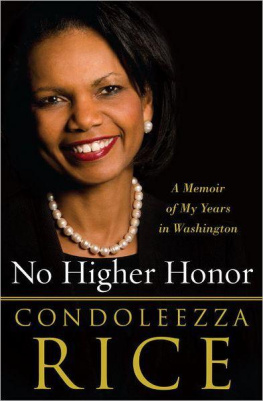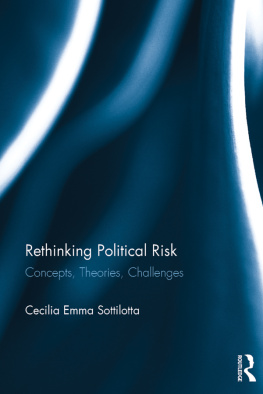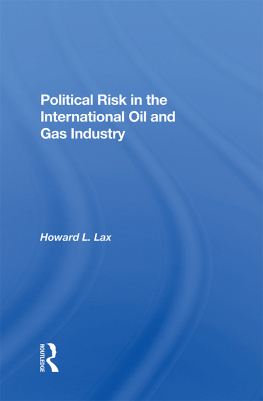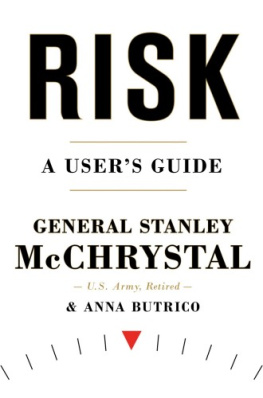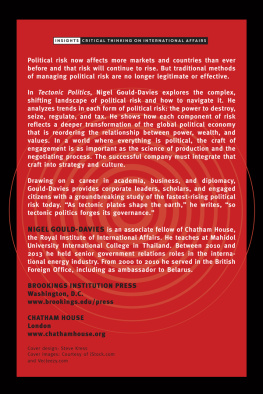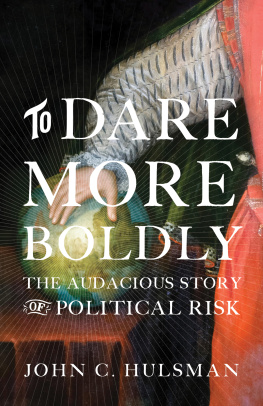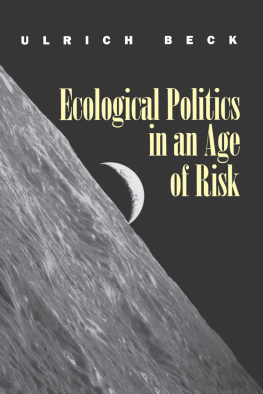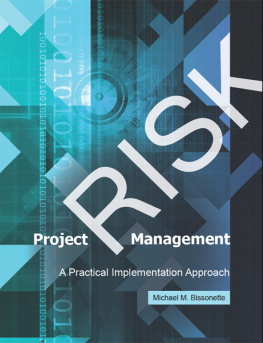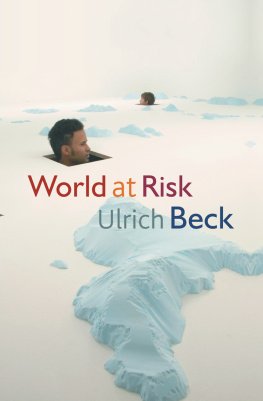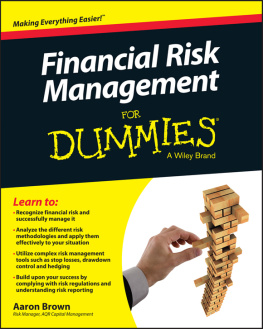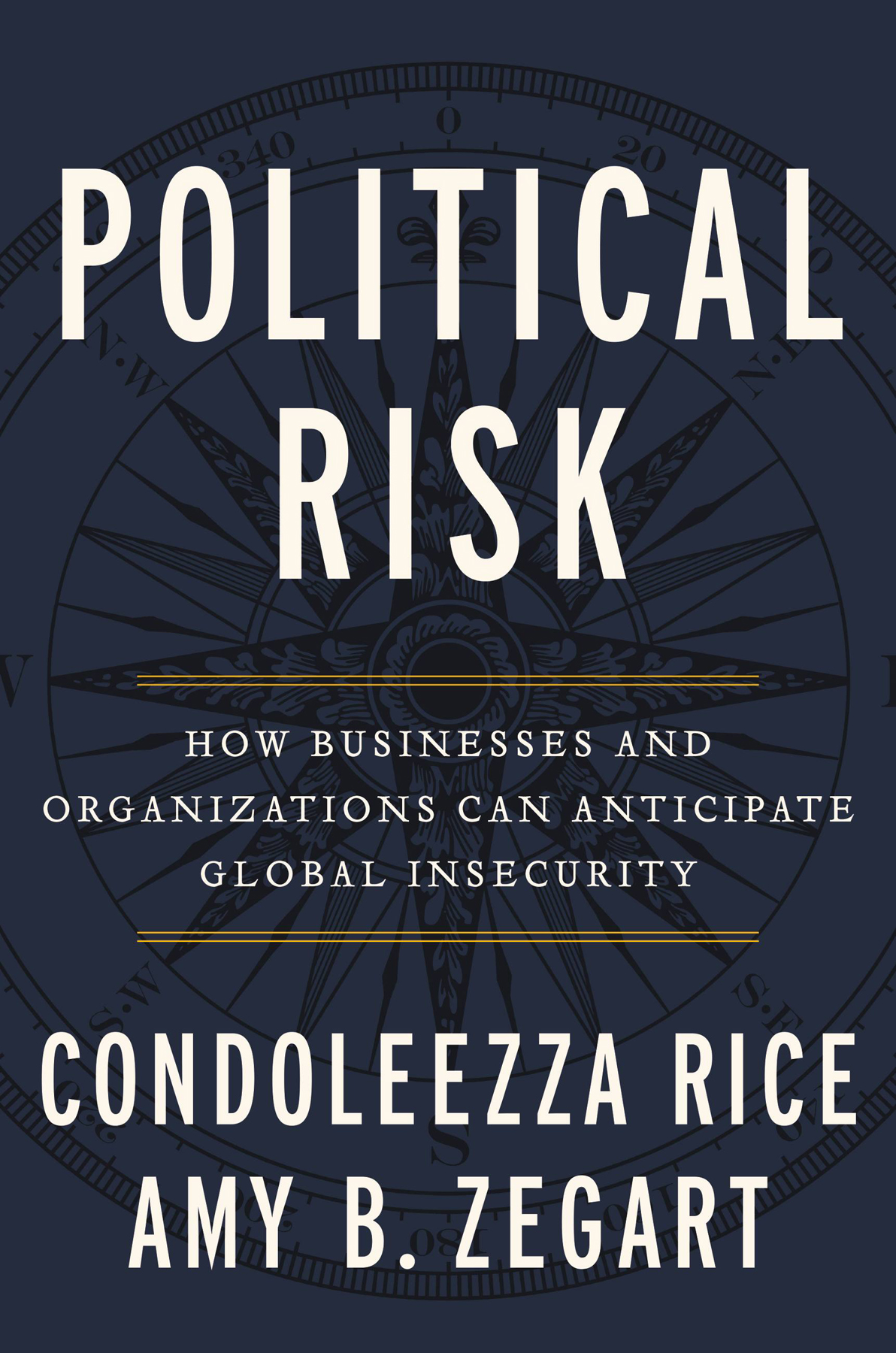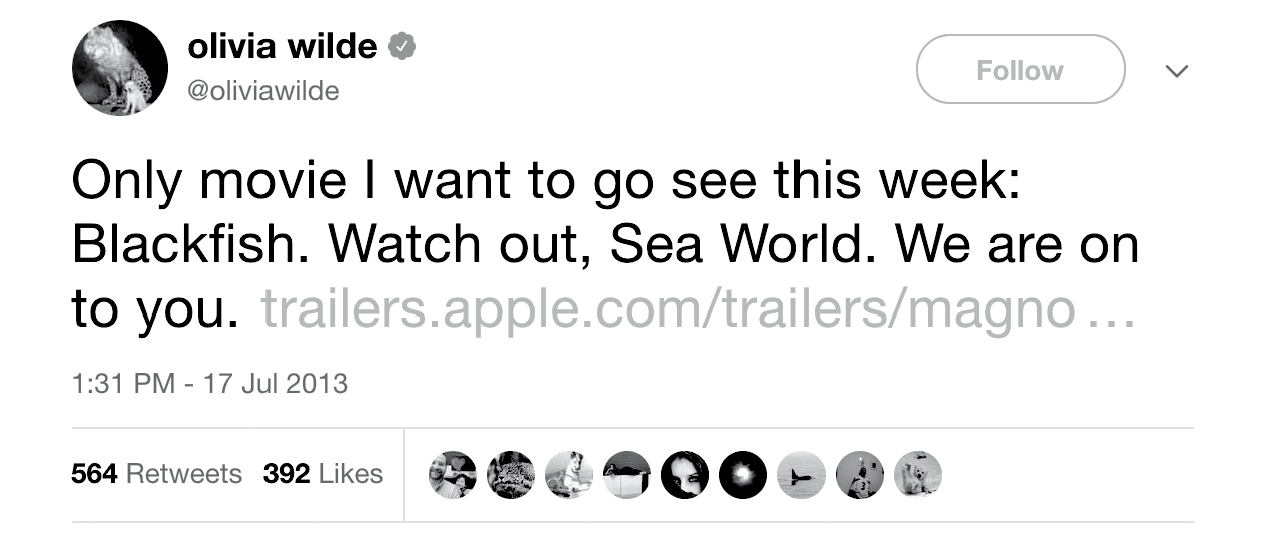Thank you for buying this ebook, published by HachetteDigital.
To receive special offers, bonus content, and news about ourlatest ebooks and apps, sign up for our newsletters.
Copyright 2018 by Condoleezza Rice and Amy Zegart
Cover design by Jarrod Taylor. Cover illustration by Getty Images.
Cover copyright 2018 by Hachette Book Group, Inc.
Hachette Book Group supports the right to free expression and the value of copyright. The purpose of copyright is to encourage writers and artists to produce the creative works that enrich our culture.
The scanning, uploading, and distribution of this book without permission is a theft of the authors intellectual property. If you would like permission to use material from the book (other than for review purposes), please contact permissions@hbgusa.com. Thank you for your support of the authors rights.
Twelve
Hachette Book Group
1290 Avenue of the Americas, New York, NY 10104
twelvebooks.com
twitter.com/twelvebooks
First Edition: May 2018
Twelve is an imprint of Grand Central Publishing. The Twelve name and logo are trademarks of Hachette Book Group, Inc.
The publisher is not responsible for websites (or their content) that are not owned by the publisher.
The Hachette Speakers Bureau provides a wide range of authors for speaking events. To find out more, go to www.hachettespeakersbureau.com or call (866) 376-6591.
Library of Congress Cataloging-in-Publication Data
Names: Rice, Condoleezza, 1954- author. | Zegart, Amy B., 1967- author.
Title: Political risk : how businesses and organizations can anticipate global insecurity / Condoleezza Rice and Amy Zegart.
Description: First edition. | New York : Twelve, 2018. | Includes bibliographical references and index.
Identifiers: LCCN 2017054476 | ISBN 9781455542352 (hardcover) | ISBN 9781478914792 (audio download) | ISBN 9781549115547 (audio book) | ISBN 9781455542369 (ebook)
Subjects: LCSH: Risk management.Political aspects. | World politics.
Classification: LCC HD61 .R49 2018 | DDC 658.15/5.dc23
LC record available at https://lccn.loc.gov/2017054476
ISBNs: 978-1-4555-4235-2 (hardcover), 978-1-4555-4236-9 (ebook)
E3-20180316-JV-PC
Extraordinary, Ordinary People: A Memoir of Family
No Higher Honor: A Memoir of My Years in Washington
Democracy: Stories from the Long Road to Freedom
Also by Amy Zegart
Flawed by Design: The Evolution of the CIA, JCS, and NSC
Spying Blind: The CIA, the FBI, and the Origins of 9/11
Eyes on Spies: Congress and the United States Intelligence Community
To our Stanford GSB 584 students,
for inspiring us to teach and asking us each year,
Why isnt this course a book?
I n April 2013, SeaWorld Entertainment, Inc., was riding high. The American theme park company had completed an initial public offering that exceeded expectations, raising more than $700 million in capital and valuing the company at $2.5 billion. To many Americans, SeaWorld offers family fun amid penguins and killer whales, gushed the New York Times. The story ran with a picture of two adorable penguins waddling around the New York Stock Exchange as part of a promotional tour.

Richard Drew, Associated Press
Eighteen months later, SeaWorld Entertainments fairy tale had become a nightmare. The stock price had plunged 60 percent and CEO Jim Atchison announced that he was resigning. No adorable penguins this time: Instead, the pictures accompanying the headlines featured a giant orca. Suddenly, SeaWorlds famed killer whales were killing the company.
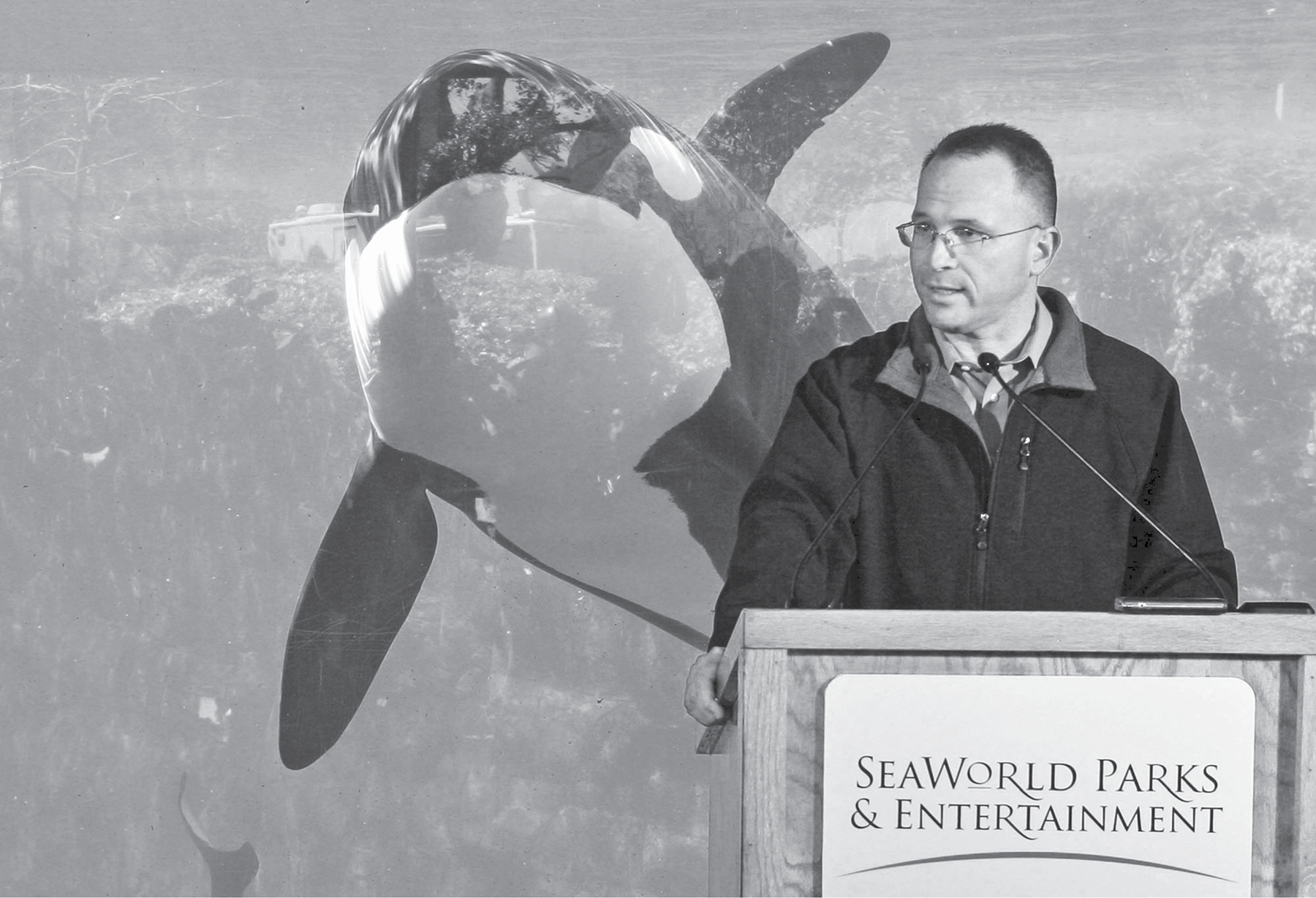
Orlando Sentinel, Getty Images
Atchison and SeaWorld were blindsided by political risk. Not just any kind of political risk, but twenty-first-century political risk, where the political actions of small groups, or even lone individuals, supercharged by connective technologies, can dramatically impact businesses of all kinds.
It all started with a Los Angeles documentary filmmaker named Gabriela Cowperthwaite, who liked taking her twins to see the orcas perform at the SeaWorld theme park in San Diego. In 2010, Cowperthwaite happened to read a tragic story about how an orca named Tilikum killed veteran trainer Dawn Brancheau in the middle of a show at SeaWorlds Orlando park. Actress Olivia Wilde was just one among many who took to Twitter.
Animal rights groups seized the initiative. Online petitions mounted. Public pressure grew. Musical groups including Willie Nelson, Barenaked Ladies, Heart, and Cheap Trick canceled shows at SeaWorld.
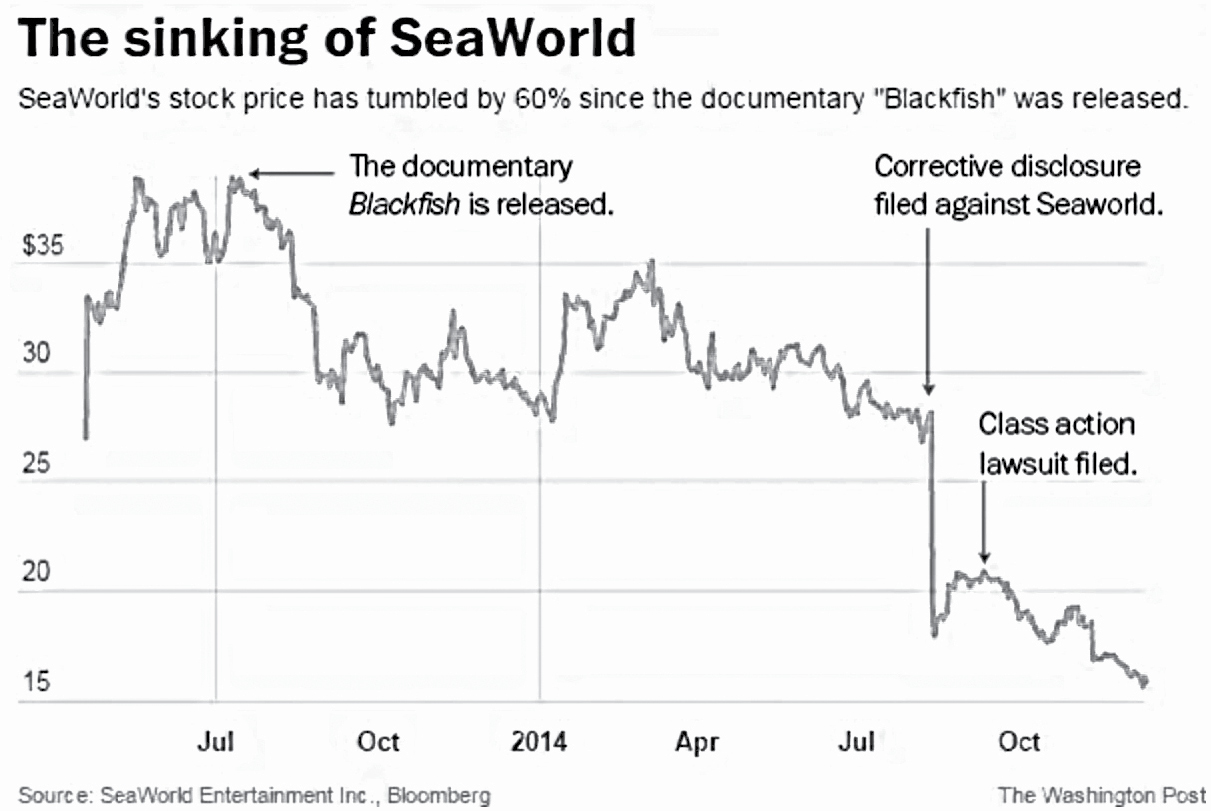
Washington Post
Political risk was once just about the actions of governments, such as dictators seizing assets or legislatures regulating industries. Today, governments are still the main arbiters of the business environment, but they are no longer the only important ones. Instead, anyone armed with a cell phone or a Twitter or Facebook account can create political risks, galvanizing action by other citizens, customers, organized groups, and political officials at the local, state, federal, and international levels. Events in far-flung places are affecting societies and businesses around the world at dizzying speeds. Anti-Chinese protests in Vietnam lead to clothing stock-outs in America. Civil war in Syria fuels a refugee crisis and terrorist attacks in Europe, leaving nations reeling and the tourism industry shaken. Video of a United Airlines passenger being forcibly dragged off a plane in Chicago goes viral in China. A North Korean dictator launches a cyber attack on a Hollywood movie studio.
This is not your parents political risk landscape.
Put in the most elemental terms, twenty-first-century political risk is the probability that a political action could affect a company in significant ways.
Twenty-first-century political risk is the probability that a political action could significantly affect a companys business.
This definition is more radical than it sounds. We chose the words political action, not government action, to highlight the growing role of risk generators outside of the usual places like capitals and army barracks and party headquarters. Increasingly, political actions that impact businesses are happening everywhereinside homes, on the streets, and in the cloud; in chat rooms, dorm rooms, and boardrooms; in neighborhood bars and summit sidebars. Companies that want a competitive edge need to manage the risks generated by this widening array of global political actors, from documentary filmmakers to international institutions like the European Union. As we discuss in the next chapter, the Blackfish effect is just one type of political risk. There are many others, from traditional risks like geopolitics to emerging risks that cross borders into boardrooms, like cyber threats and terrorism.


